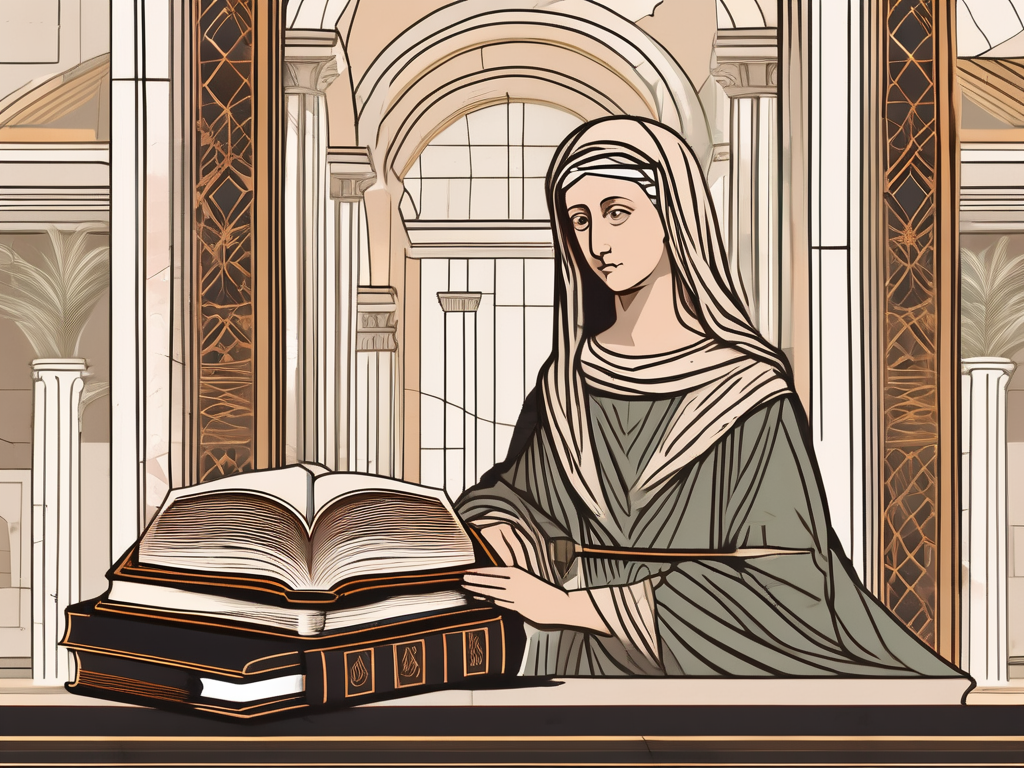Saint Catherine of Siena, also known as Catherine di Benincasa, was a renowned and influential figure during the 14th century in Italy. Her life and works continue to inspire millions around the world. From her humble beginnings to her profound impact on society and the Church, Catherine’s story is one of faith, dedication, and unwavering perseverance. Let’s delve into the details of her remarkable life and enduring legacy.
Early Life of Saint Catherine of Siena
Saint Catherine of Siena, a revered figure in Catholicism, was born in Siena, Italy, in the year 1347. She was the youngest of twenty-five children, born into a well-respected and pious family. Her parents, Jacopo and Lapa, were devout believers who instilled in her a deep devotion to God from a young age.
Birth and Family Background
The joyful arrival of Catherine brought immense happiness to her family. They rejoiced in the gift of her presence, seeing it as a blessing from above. Catherine’s birth was seen as a sign of divine favor, as her family believed that God had chosen her for a special purpose. Growing up, Catherine was surrounded by love and spirituality, which laid the foundation for her remarkable spiritual journey.
As the youngest child, Catherine received special attention and care from her parents and older siblings. They doted on her, showering her with affection and nurturing her spiritual growth. Her family’s deep faith and commitment to God served as a constant source of inspiration for Catherine, shaping her character and values.
Childhood and Education
Catherine’s childhood was marked by a strong inclination toward prayer and contemplation. Even at a young age, she displayed a profound spiritual sensitivity, often withdrawing to her room and spending hours in silence and solitude, connecting with God in her own unique way. Despite being unable to read or write, Catherine possessed a wisdom that surpassed her years.
Recognizing her thirst for knowledge and spiritual enlightenment, Catherine’s parents decided to enroll her in a local school when she turned six. At school, she received a basic education, learning to read and write. However, her education went beyond the confines of textbooks. Catherine’s true education came from her deep spiritual experiences and her unwavering commitment to understanding God’s will.
As Catherine grew older, her spiritual insights became more profound, and she began to attract attention from religious leaders and scholars in Siena. They recognized her unique gifts and sought her counsel on matters of faith and spirituality. Despite her lack of formal education, Catherine’s wisdom and spiritual depth were widely acknowledged and respected.
Throughout her early life, Catherine’s unwavering faith and dedication to God continued to shape her character and prepare her for the extraordinary path that lay ahead. Little did she know that her spiritual journey would lead her to become one of the most influential figures in the history of Christianity.
Saint Catherine’s Spiritual Journey
Catherine’s spiritual awakening unfolded during her teenage years, when she experienced a life-changing encounter with God. This encounter left her with a burning desire to deepen her relationship with the divine and to dedicate her life entirely to God’s service.
As Catherine grew older, her faith continued to blossom. She found solace in prayer, spending hours in contemplation and seeking guidance from the Lord. Through these moments of communion with God, Catherine felt a profound sense of peace and purpose.
Her Calling and Vows
At the age of sixteen, Catherine made a pivotal decision that would shape the course of her life. Inspired by her unwavering faith and devotion, she made a private vow of chastity, committing herself to a life of purity and selflessness. This vow served as a constant reminder of her dedication to God and fueled her desire to serve others.
Catherine’s commitment to her vow went beyond mere words. She actively sought opportunities to help those in need, whether it be through acts of charity or offering a listening ear to those who were suffering. Her selflessness and compassion became a testament to her unwavering faith.
Joining the Dominican Order
In pursuit of a deeper spiritual understanding, Catherine sought to join the Dominican Order. This decision was met with opposition and skepticism from her family, who questioned her choice to enter religious life at such a young age. However, Catherine’s determination and unwavering faith enabled her to overcome these obstacles.
Entering the Third Order of the Dominicans, Catherine found herself surrounded by like-minded individuals who shared her passion for God and desire for spiritual growth. The order provided her with the spiritual support and guidance she longed for, allowing her to delve deeper into her relationship with God.
Within the Dominican Order, Catherine’s gifts and talents flourished. She became known for her wisdom and insight, often sought after for spiritual counsel by both fellow members of the order and those outside of it. Catherine’s ability to offer guidance and comfort to others became a testament to the transformative power of her faith.
Throughout her journey, Catherine’s unwavering faith and dedication to God remained the driving force behind all her actions. Her spiritual awakening and subsequent journey serve as an inspiration to all who seek a deeper connection with the divine.
Major Contributions and Works
Catherine of Siena, a remarkable figure in Church history, made significant contributions that extended far beyond the walls of the convent. Her indelible mark on the papacy and her role in shaping theological discourse during a challenging period are testaments to her enduring influence.
While Catherine’s influence was felt in various aspects of Church life, her impact on the papacy was particularly noteworthy. Through extensive correspondence with popes, she tirelessly advocated for reform and unity within the Church. Her passionate letters and persuasive arguments made a profound impact on the leaders of the time, influencing their decisions and actions. Catherine’s unwavering commitment to the Church’s well-being and her ability to articulate her convictions with clarity and conviction earned her the respect and attention of the papal hierarchy.
One of Catherine’s most significant achievements was her instrumental role in bringing the Pope back to Rome from Avignon. During the Avignon Papacy, the papal court was situated in France, which led to a period of perceived corruption and political interference in Church affairs. Catherine, recognizing the importance of the papacy’s authority being firmly rooted in Rome, tirelessly campaigned for the Pope’s return. Her efforts were not in vain, as she successfully convinced Pope Gregory XI to leave Avignon and reestablish the papacy’s rightful place in Rome. This momentous event not only restored the papacy’s credibility but also solidified Catherine’s reputation as a powerful force for positive change within the Church.
In addition to her influential role in the papacy, Catherine’s writings and teachings continue to inspire and guide spiritual seekers and theologians alike. Her written works, including her extensive collection of letters and her renowned masterpiece “The Dialogue,” offer profound spiritual insights and theological wisdom.
“The Dialogue” is a remarkable literary work where Catherine engages in a fictional conversation with God. Through this dialogue, she delves into profound theological concepts, exploring the nature of God, the human condition, and the path to spiritual growth. Catherine’s ability to convey complex ideas in a relatable and accessible manner is a testament to her intellectual prowess and spiritual depth.
Her letters, which were addressed to a wide range of recipients, including popes, political leaders, and ordinary individuals, reveal her compassionate nature and her unwavering commitment to the well-being of others. In these letters, Catherine offers guidance, encouragement, and admonishment when necessary, always with the aim of fostering spiritual growth and promoting unity within the Church.
Catherine of Siena’s writings and teachings continue to be studied and revered by scholars and spiritual seekers alike. Her profound insights into the human experience and her unwavering faith in God’s love and mercy provide invaluable guidance for those seeking a deeper understanding of their spiritual journey.
Miracles and Canonization
Throughout her life, Catherine was known for her extraordinary spiritual experiences and reported miracles, which only served to enhance her reputation as a saintly figure.
Reported Miracles and Mystical Experiences
Catherine’s mystical encounters with God were numerous. She experienced visions, ecstasies, and the stigmata, physical manifestations of Christ’s wounds. These remarkable occurrences not only deepened Catherine’s faith but also inspired those around her.
Process and Proclamation of Sainthood
Recognizing Catherine’s holiness and the impact of her works, the Catholic Church embarked on the process of canonization. In 1461, Pope Pius II declared Catherine a saint, affirming her position as an exemplary Christian and a powerful intercessor.
Impact on Society and Church
Catherine’s influence extended beyond her lifetime, as she left an indelible mark on society and the Church, particularly during the challenging period of the Great Schism.
Role in the Great Schism
The Great Schism was a period of turmoil and division within the Church, characterized by the presence of two rival popes. Catherine boldly expressed her views, advocating for the reunification of the Church. Her relentless efforts to bring about peace and unity placed her in a position of moral authority and garnered respect from both religious and political leaders.
Legacy in Theology and Feminism
Catherine’s teachings and writings continue to shape theological discourse, particularly in the areas of mysticism and spiritual enlightenment. Her emphasis on the importance of the individual’s direct relationship with God paved the way for future spiritual thinkers. Furthermore, she is hailed as an early feminist figure, embodying the strength and intelligence of women during a time when their voices were often silenced.
In Conclusion
The life and legacy of Saint Catherine of Siena are a testament to the power of faith, perseverance, and unwavering commitment to God. Her spiritual journey, major contributions, and remarkable experiences continue to inspire and guide individuals in their own pursuit of divine connection. Catherine’s impact on society and the Church was immense, leaving a lasting imprint that transcends time. She remains a beacon of light and a source of inspiration for all who seek to deepen their relationship with God.












